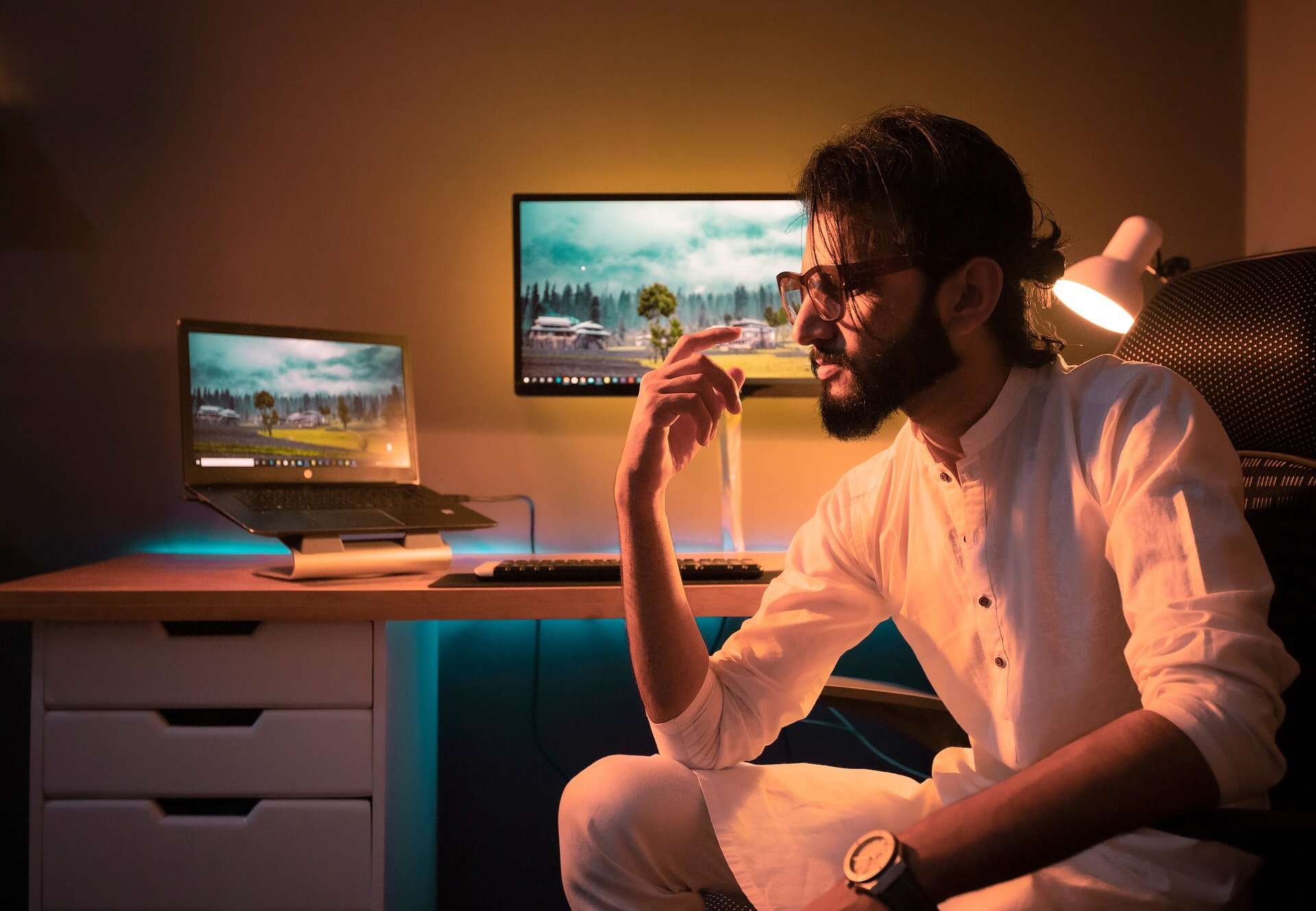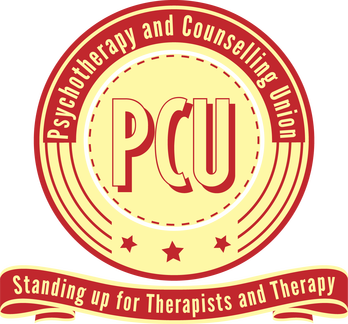
Your Preparations for Video Counselling
You've made a commitment to meet with Dean Richardson MNCPS (Accred/Reg) for couple, throuple or group counselling over Video Conferencing (Zoom, Skype etc). Now let's discuss essential tips that will help you prepare for video counselling...NB: whilst this page is intended for clients who have already arranged their first appointment with Dean, and are making final preparations for their session, others who are interested in the preparations for video counselling are welcome to read through this page too…
One Video Device per Partner
It is important that all participants are able hold conversations amongst themselves during a session (as well as directly with the counsellor), and that the counsellor is able to see and hear all partners. When in the same location as each other, sitting together on a couch or facing chairs can be unsatisfactory in the confines of video counselling. Using one-device-per-partner greatly improves upon this approach (and is the only approach when partners are in different locations).
Additionally, previous clients have shared that sitting in separate rooms (even in separate locations) gave them a useful sense of “we’re not at home.” This further empowers partners to discuss topics that were not normally possible within their home.
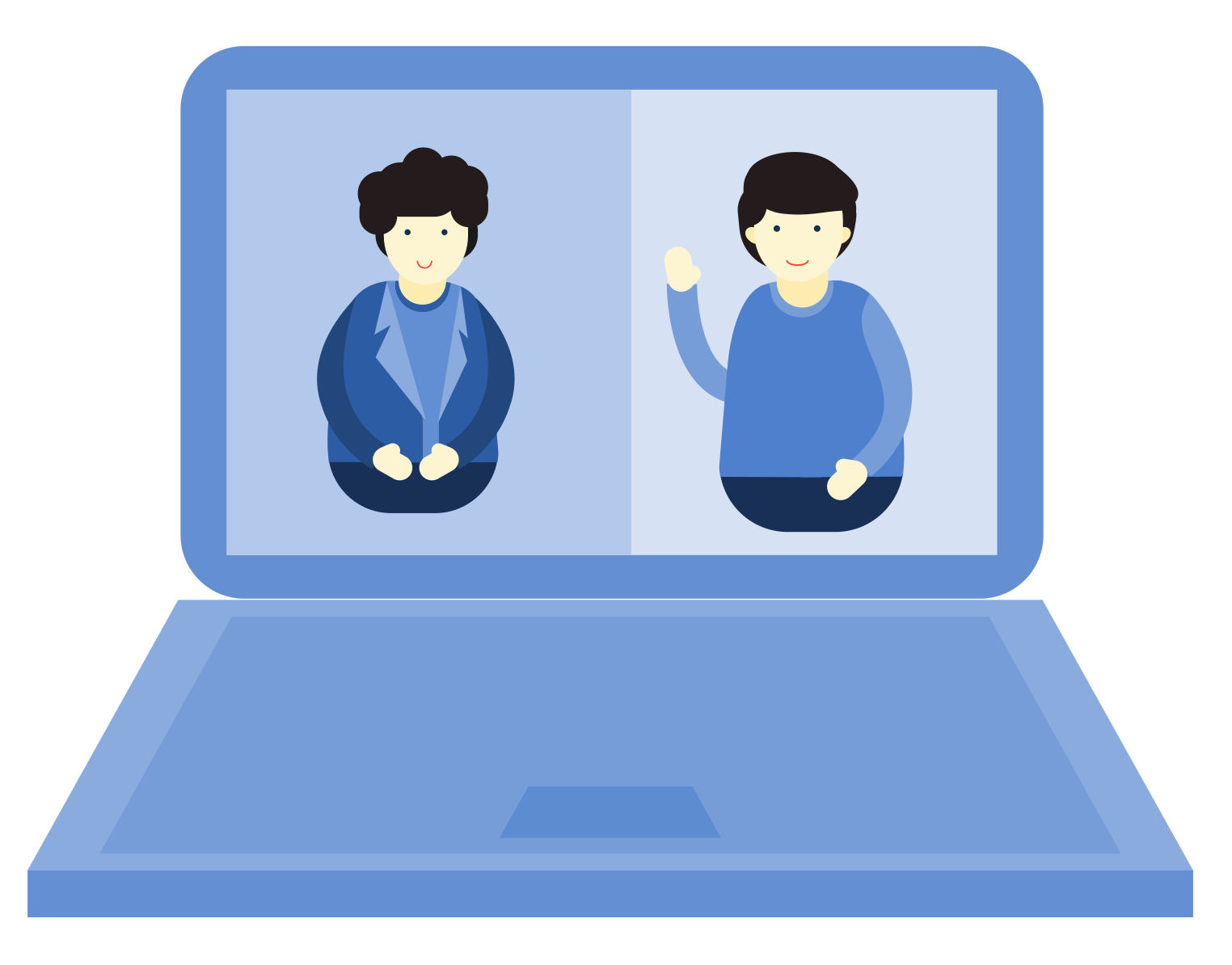
Yes 👍. As described in the block above, I use a rather distinct, and effective, approach for couples and groups meeting with me on video for counselling: one individual device per partner.
If this is not to your liking, we can always experiment with different approaches to suit a particular relationship’s needs.
Experience Taught by “Long-Distance” Couples
Over 18 years of working with couples in long-distance relationships, I have observed an interesting phenomenon: when separated by distance couples discuss matters that were previously undiscussable together.
Partners living together (the same home) also benefit from a little distance: using individual devices. I find that this approach encouraged a therapeutically useful “were-not-at-home” sense during sessions. It made some difficult topics more discussable due to separating the relationship putting a small amount of distance between them.
A Distinct Approach
I recommend couples (and groups) meet with me using one device each… and sit in different locations (rooms, homes, cars etc) to each other where possible.
This is not a compulsory requirement (we can be creative, otherwise), but it gives us an advantage over face-to-face counselling: by the end of our counselling arrangements we’ll have enabled the partners to talk to each other about difficult issues that aren’t generally discussable otherwise.
Individual video devices provides a sense of safer-distance, allowing tough subjects to be discussed in a safer therapeutic setting.
With the majority of us now owning an individual Smartphone (yes, Smartphones work very well in video-counselling too), or having access to a personal computer, using one video-device per person is a realistic option nowadays.
An Overview of your Preparations
How do we go about setting up and beginning our first counselling session over Zoom or Skype Video?
Here are some easy steps to follow:-
- You’ll install the free-of-charge app onto your device (allowing you to test things beforehand).
- You’ll send your session fee prior to the session (such as using your Banking App to make a BACS transfer or paying by card/PayPal using my Online Card Payment Service).
- A few minutes before a counselling session begins:
- You’ll mute any audio distractions (iOS/Android notifications, TV/radio etc).
- You’ll sign-in to your private Zoom meeting room, or private Skype group.
- At the session time, Dean will join you in the video session.
- The first session follows a fluid framework* to help the couple or group get started. Subsequent sessions follow the focus more and more as set by the clients’ needs.
Before all this happens, though, you will have been in contact with Dean to arrange a weekly session day and time. You’ll have sent in your £30 deposit to confirm your appointment and details of how the session works will have been sent to you. You’ll be well and truly prepared before the first session begins!
Zoom
- A private meeting room will have been created when we began setting up our counselling contract. You will have been emailed the room’s URL and password.
- You may join the meeting before Dean connects. You’ll start off a “waiting room”. This is a security feature so that no-one else can join our session.
- At the session start time, Dean will move everyone from the waiting room into the meeting.
Skype
- Ensure Skype is loaded and you are logged in.
- A Skype “Group” will have been created when we were setting up our counselling contract. You will have been emailed access to the group. Before each counselling session begins you will both sign into the group. At the session start time Dean will join the group.
Preparations in Detail
Preparations for Individuals, Couples & Groups.
- Remember that counselling sessions are a professional engagement. Even though you're at home with easy access to your fridge and comfy pyjamas, attend as if you were meeting in an office.
- DO NOT attend a session from a public location (such as a pub, a cafe, an open-plan office, etc) unless you are absolutely sure that your privacy and confidentiality will not be at risk.
- Have your video device prepared well in advance with the software installed that you and Dean have agreed. Ensure that your Operating System and App have all updates installed beforehand (some upgrades can take a long time).
- Use a headset/microphone combination (such as those supplied with your Smartphone, or computer). Not only is it helpful for your privacy, but some video conferencing operates significantly better by using a headset rather than speakers.
- Zoom Auto-framing: in Zoom's settings, go to Video/Audio and turn off auto-framing.

While auto-framing is a clever feature, but it causes your camera to veer off to the sides or zoom in to parts of your face (or with couples, it will cause zooming-in to your partner when the counsellor needs to see both of you), Auto-framing is not our friend during counselling sessions!
- Use a table or stand if using a tablet or Smartphone (rather than holding the device for 50/90 minutes). Keeping the device held not only relieves your hands and keeps the camera steady, but it also helps prevent feelings of sea-sickness in the observer when you're moving your camera.
- Try to place your camera at eye level so that you're looking at your device on the horizontal. This ensures that you're not looking down or up at your counsellor (which can feel a little disturbing).
- Ensure that your face is lit. This may mean you sitting facing a light-source (the window, a lamp etc). Try not to sit with your back to a strong light (eg the sun in the window behind you) as this can make you appear in shadow or blast-out your video camera (i.e. everything in the frame is blacked-out).
- You will need a room that's private and away from others' earshot. If this is not possible, perhaps others in your house might leave for an hour).
- Ensure that your environment is quiet - video conferencing uses technology that can "take over" the audio channel when you speak (or when there is sound in your room). If your room is noisy, you may find that the counsellor's voice becomes cut-off or interrupted.
- Make sure you won't be disturbed: tell others in your house not to come into your room. Maybe put a note on your room's door - or your house's front door - saying "Do Not Disturb" so that others are reminded before they enter your room and/or your doorbell isn't rung. It's quite disturbing when you're halfway through discussing something private or sensitive only to have someone burst into your room (be it a child needing your attention or another adult).
- Be aware of your environment: think about things such as lighting where the window is, how far away you are from the microphone and camera, is there other things on your device's screen that might distract you, are your messaging apps closed, are all bandwidth sucking apps closed (eg Dropbox, Google Drive etc - or someone in your location streaming video).

Preparations for Couples & Groups.
- Prepare to use one video device per person rather than one device for two or more of you. Couples and groups have commented that while attending a video counselling session, it can feel helpfully "we're not at home" to be physically separated while speaking with one's partner(s) via video. This is not compulsory (we can discuss other ways of working) it is an approach that can assist the relationship in discussing matters that would not normally be discussed "together at home".
- In addition to multiple devices, I recommend you be in separate rooms from each other (e.g. living room / kitchen). This is not compulsory, but if your voice can be picked up by your partner's microphone, this will introduce audio echo; you may have to mute your microphone when you're not speaking.
- When calling from the same location, it may seem illogical to use two devices. Note the illustration for Couple Counselling: when working face-to-face with couples, both partners are angled away from the counsellor and more towards each other. This promotes the couple focusing upon their relationship (holding conversations, listening to each other etc) and the counsellor is able to observe and intervene. Such positioning also helps promote the concept of the counsellor being a therapeutic consultant rather than someone the couple sit in front of (like a cinema audience might) attending to him delivering a lecture upon the couple's relationship.
- When working with groups of 3 or more if people speak over each other we may talk about how we creatively manage each person having their voice heard (when they want it to be) - such as using a virtual "talking stick".
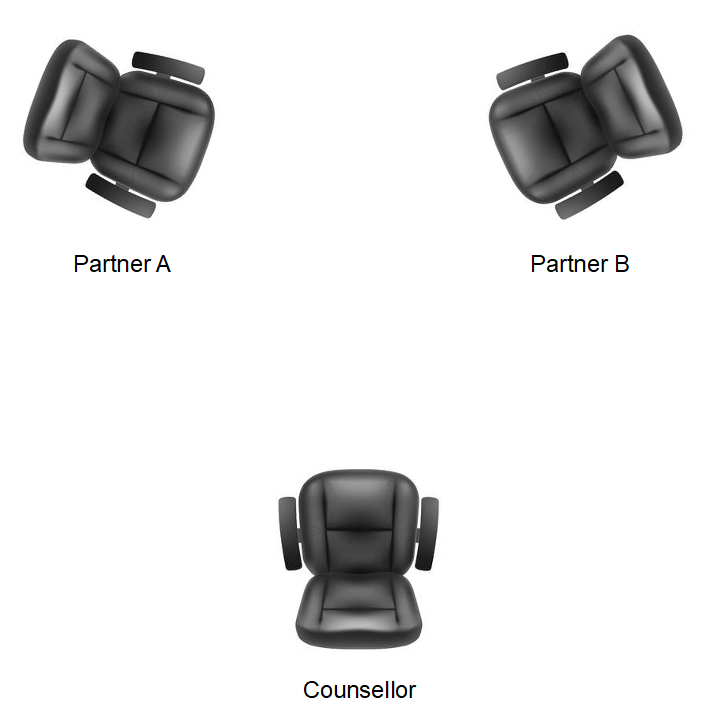
- Of course, there are always alternative approaches to using one-device-per-person or sitting in separate rooms/locations. We can always set aside some time for this. As long as the main aims are catered for such as (a) the couple or group will be talking with each other during the session, (b) the counsellor is able to see and hear all partners throughout the session, and (c) the counsellor is available for consultation, feedback and intervention (rather than being positioned as the-expert-in-the-session-with-all-the-answers).
- During a counselling session, if one-or-more of you intentionally disconnects the session will be brought to a close depending on who remains. Think of it like this: Relationship Counselling is therapy for a relationship (duh 🤣), and when a partner disconnects we might wonder if the relationship has effectively left the therapy session. Counselling can resume at the next scheduled session should all contracted partners attend.
- If one or more of you unintentionally disconnects during the session, we will try to re-establish the connection as best we can, but we won't continue the session in a partner's absence.
- If one or more of you leaves Relationship Counselling entirely: I will work with the remaining partner(s) for a handful of sessions to bring our contracted work to a close. We won't switch to another contract (individual for couples, or couples/individual for groups). You are welcome to engage with an alternative counsellor for your needs.
- Sessions may be arranged for one partner alone (in the case of couple counselling) or for a subset of the group if we have (a) previously discussed that this meets with everyone's approval and (b) the attending partner(s) and counsellor update the absent partner(s) about what was discussed in their absence. Such situations might be if one or more partner(s) is/are unable to attend the occasional session.
About Dean Richardson MNCPS (Accred/Reg)
You could choose any couple / group counsellor…
Given that this will be the most intimate and vulnerable you could feel alongside your partner(s), you would want a skilled professional whose experience and specialism you could trust; whose focus would be upon your distinct relationship. Your couple, throuple or group relationship will be in good hands with Dean. He works from Great Britain, is Independent of "box 'em/shift 'em" therapy services, and identifies as a gay couple counsellor. He's also easily payable in pounds sterling! Dean already had an impressive 18 years actual video "webcam" experience - way before the first British emergency began (when suddenly many counsellors added a Video option to their portfolio, having not practised so previously! 🤔).
What makes Dean Distinct
- Dean is sensitive and effective to your sexuality / gender-identity and intimate ways of relating to each other. You'll discover quickly that Dean is an informed member of your own community.
- Dean demonstrates adept skills with lesbian, gay, bisexual, asexual, fluid, mixed sexuality and same-or-mixed gender relationships having over 26 years' experience as a counsellor.
- Dean avoids taking a the role of "all-knowing expert" (whether requested or projected onto him by the clients). "Experts" tell you what to do, do not learn very well from others, and struggle to adapt to new situations. A couple counsellor must be curious, adaptive, and ask questions from a "not knowing" position so that the relationship in counselling benefits from re-examination.
- Dean speaks plain English (and can swear like a virtuoso if you like, or not at all if you prefer). He works cooperatively with your relationship (no unnecessary silence, or just "hmms...").
- Dean was originally accredited by his first professional body 17 years ago; he is now an accredited registrant with The National Counselling and Psychotherapy Society. Accreditation is a valued recognition of a counsellor's substantial experience. Dean is also a member of the Psychotherapy and Counselling Union of Great Britain.
- Dean is a British Counsellor working from the South of England. Unlike other counselling services operating from abroad Dean is registered, accredited, insured & supervised from within England (not from abroad).
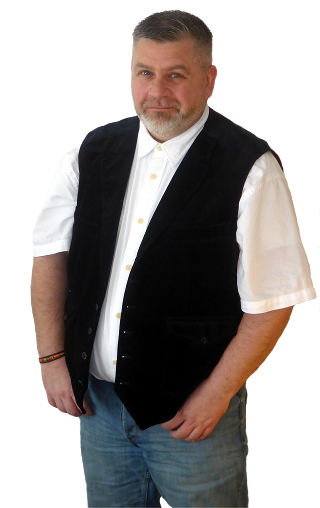
If any of this resonates with you and your partner(s), you should probably meet with the Gay Relationship Counsellor: Dean Richardson MNCPS (Accred/Reg) via Zoom, Teams, Whatsapp and other secure, reliable video conferencing media.
Dean focuses on LGBT/QIA+ relationships as a specialty in therapy. He works with individuals, couples and small groups. Plus, he's qualified to a postgraduate level (Chichester PG Diploma in Psychodynamic / Systemic Couple Counselling, IGA National Foundation in Group Counselling), and works as a private practice counsellor employing 26+ years experience*.
(*Very Important: not all counsellors have such specific skills for working with couples nor groups. Those who are initially trained to use common "Individual" Counselling skills have no experience in working therapeutically with relationships. Such counsellors may try, perhaps out of misplaced goodwill, to employ "individual" techniques (multiplied by 2) but the couple or group will find that the approach is ineffective. Simply put: it's the wrong approach; your relationship is not part of the counsellor's primary theoretical framework. Remember always to ask your potential counsellor: "what qualifies you to work with our relationship?" and trust your instincts based on what you hear.

